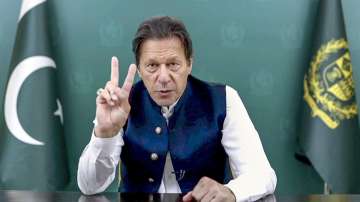Pakistani Prime Minister Imran Khan has said that he would like to have a televised debate with his Indian counterpart Narendra Modi to resolve the issues between the two neighbouring nations.
"I would love to debate with Narendra Modi on TV," Imran Khan told Russia Today in an interview. "It would be good for over a billion-plus people in the Indian subcontinent if differences could be resolved through debate." Khan will travel to Russia on Wednesday on a two-day visit - the first by a Pakistani premier in over two decades.
Khan said that after Pakistan Tehreek-e-Insaf, the party which he founded in 1996, formed the government in 2018, he reached out to India to resolve the differences.
"When my party came to power in 2018, the first thing I did was to reach out to India. I told them that our only issue is Kashmir. Let's sit down at the table and resolve it. Let's have a roadmap," Imran Khan
"I am the one who knows India better than anyone because cricket is a passion in the subcontinent. And because of me being the captain of the cricket team I know India better than most people. I immediately reached out. But then I discovered to my horror that this is not the India I used to know because it is being taken over by this mad ideology," he said.
"There is negative nationalism and there is positive nationalism. You must distinguish between these two. I can inspire my people by saying look you were a great nation, let's get back now again. But if I say you were a great nation but because of these other human communities you couldn't reach the top...it shifts the hatred towards them, there is always bloodshed," Khan said.
Pakistan was carved out as a Muslim country after the division of India by the British colonial rule in 1947. While India was formed of all the religions including Hindu, Muslim, Christians and others, Pakistan was formed mostly of Muslims and emerged as a conservative Islamic state.
India and Pakistan share a border of around 3,30 km. Three Indian states -- Punjab, Rajasthan and Gujarat and the Union Territory of Jammu and Kashmir share a border with Pakistan.
India has repeatedly said it desires normal relations with Pakistan and it was for that country to create a conducive atmosphere by taking "credible, verifiable and irreversible" action against cross-border terrorism. But Pakistan has failed to crack down on terror groups and punish terrorists. It often invites shame at international forums for being a haven for terror outfits.
Ties between the two nations nosedived after a terror attack on the Pathankot Air Force base in 2016 by terror groups based in Pakistan. Subsequent attacks on an Indian Army camp in Uri further deteriorated the relationship. Since then, India has not been having bilateral talks with Pakistan saying talks and terror cannot go hand-in-hand.
The relationship further dipped after India's warplanes pounded a Jaish-e-Mohammed terrorist training camp deep inside Pakistan on February 26, 2019, in response to the Pulwama terror attack in which 40 CRPF jawans were killed. The ties hit rock bottom after India announced withdrawing Jammu and Kashmir's special powers and bifurcating the state into two union territories in August 2019. Since then, Pakistan has been unsuccessfully trying to rally international support against India on the Kashmir issue.
READ MORE: Pakistani rock salt sparks debate between Indians, Paks on social media
Latest World News
